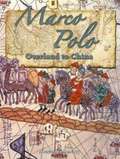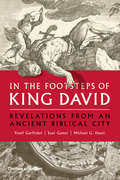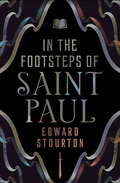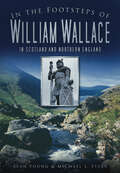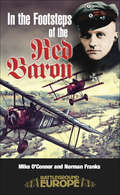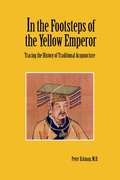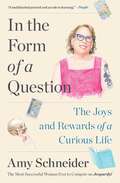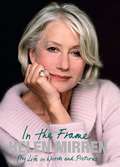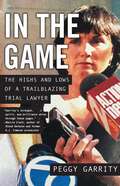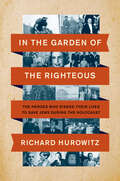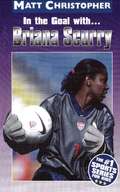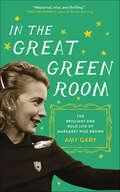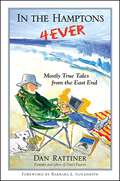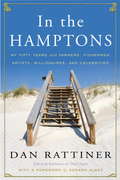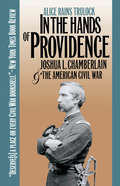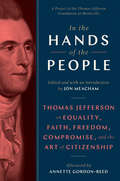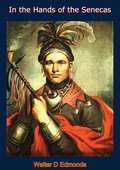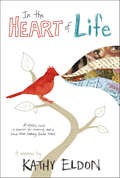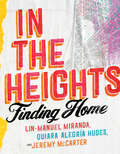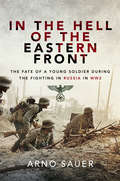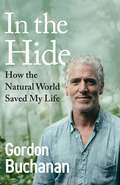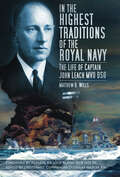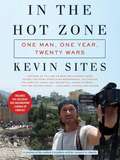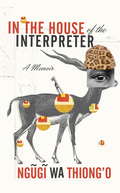- Table View
- List View
In the Footsteps of Explorers: Marco Polo Overland to China
by Alexander ZelenyjMarco Polo was an Italian explorer who travelled to Asia, where he served in the court of China's great Mongol emperor Kublai Khan. By writing a book of his discoveries and adventures, Marco offered Europe its first look at eastern cultures and traditions.
In the Footsteps of King David: Revelations From An Ancient Biblical City
by Yosef Garfinkel Saar Ganor Michael G. HaselThe remarkable excavation of a previously unidentified city in Israel from the time of King David, shedding new light on the link between the bible and history King David is a pivotal figure in the Bible, which tells his life story in detail and gives stirring accounts of his deeds, including the slaying of the Philistine giant Goliath and the founding of his capital in Jerusalem. But no certain archaeological finds from the period of his reign or of the kingdom he ruled over have ever been uncovered—until now. In this groundbreaking account, the excavators of Khirbet Qeiyafa in the Valley of Elah, where the Bible says David fought Goliath, reveal how seven years of exhaustive investigation have uncovered a city dating to the time of David— the late eleventh and early tenth century BCE—surrounded by massive fortifications with impressive gates and a clear urban plan, as well as an abundance of finds that tell us much about the inhabitants. Discussing the link between the Bible, archaeology, and history In the Footsteps of King David explains the significance of these discoveries and how they shed new light on David’s kingdom. The topic is at the center of a controversy that has raged for decades, but these findings successfully challenge scholars disputing the historicity of the Bible and the chronology of the events recounted in it.
In the Footsteps of Saint Paul
by Edward StourtonA layman reflects on the life and legacy of the influential apostle as he retraces Paul&’s footsteps through the old Roman Empire in this biography. Regarded by many as the founder of organized Christianity, Saint Paul the Apostle is a contradictory figure. Before his conversion to Christianity, Paul persecuted Christians, and it is believed he even enthusiastically attended Saint Stephen&’s stoning. After his conversion, he began his ministry, traveling the Roman Empire and writing famous letters that are some of the earliest Christian documents. But who was he really? In this book, British radio presenter and journalist Edward Stourton recounts his own journey to real sites from St. Paul&’s life. He begins with Paul&’s birthplace of Tarsus and continues all the way to Paul&’s martyrdom in Rome more than sixty years later. With detailed research, Stourton contemplates the apostle&’s experiences, education, and background, as well as his relevance to contemporary political and social issues. Ultimately, he transforms St. Paul from an elusive New Testament figure into a flesh and blood man with a passion for his beliefs.
In the Footsteps of William Wallace: In Scotland and Northern England
by Alan Young Michael J SteadFor nearly 700 years debate has raged over the true nature of William Wallace and his role in Scotland’s turbulent history. Was he the Braveheart of Blind Harry’s legendary account, the bold, but savage, hero of the Scottish wars? Or, as some contemporary chroniclers attested, nothing but a villainous thief and vagrant fugitive? This book draws on a wide range of contemporary and modern sources to look behind the figure of legend to find Wallace’s true character. Through superb photographs, we trace the journey of Wallace from his modest upbringing in south-west Scotland and his first victory as a ‘guerilla’ leader and military commander at Stirling Bridge to his painful death seven years later. We see his ‘invasion’ of Northumberland and Cumberland. This is an essential travelling companion for a journey through Wallace’s kingdom and to learn more about the myth and the man.
In the Footsteps of the Red Baron (Battleground Europe)
by Mike O'Connor Norman FranksManfred von Richthofen became a fighter pilot on the Western Front in August 1916. By January 1917, Richthofen had shot down fifteen aircraft had been appointed commander of his own unit. He painted the fuselage of his Albatros D-III a bright red and was nicknamed the Red Baron. In June 1917, Richthofen was appointed commander of the German Flying Circus. Made up of Germany's top fighter pilots, this new unit was highly mobile and could be quickly sent to any part of the Western Front where it was most needed. Richthofen and his pilots achieved immediate success during the air war over Ypres during August and September. Manfred von Richthofen was killed on 21st April 1918. Richthofen had destroyed 80 allied aircraft, the highest score of any fighter pilot during the First World War. This book is divided into three sectors of the WWI front line in which von Richthofen operated. Each area is conveniently reached within hours. Airfield sites, memorials and the graves of Manfred's famous victims are described and directions for the battlefield walker are included with information on related museums and historic sites with special association with this most famous of fighter pilots.
In the Footsteps of the Yellow Emperor
by Peter EckmanAcupuncture now enjoys immense popularity as a major form of alternative healing in the West. Once considered mysterious and exotic, acupuncture dates from before the first century BC and the Huang Di Nei Jing (The Yellow Emperor's Internal Classic), one of ancient China's earliest philosophical and medicinal texts. What makes it so popular today? How did the traditions of acupuncture evolve, migrate, and adapt to different societies worldwide?Originally published in 1996 to great acclaim, this updated paperback edition of In the Footsteps of the Yellow Emperor offers a fascinating and highly readable account of one doctor's personal and professional quest to explore the healing traditions of Asia, its rich historical lineage, and its subsequent transmission to contemporary Europe and North America. It is a must-have book in the healing arts for all practitioners and general-interest readers. Peter Eckman, MD, PhD (New York University), MAc (College of Traditional Acupuncture, Leamington Spa, England) is editor of The Essential Book of Traditional Chinese Medicine and co-author of Closing the Circle: Lectures on the Unity of Traditional Oriental Medicine. He has a medical practice in San Francisco.
In the Form of a Question: The Joys and Rewards of a Curious Life
by Amy Schneider&“Warm and funny.&” —The New York Times * &“Refreshingly no-holds-barred.&” —USA TODAY * &“Delightful.&” —San Francisco Chronicle An inspirational, witty, and bold memoir from the most successful woman ever to compete on Jeopardy!—an exploration of what it means to ask questions of the world and of yourself as well as a passionate &“ode to learning&” (People).In eighth grade, Amy was voted &“Most likely to appear on Jeopardy!&” by her classmates. Decades later, this trailblazer finally got her chance. Not only did she walk away with $1.3 million while captivating the world with her impressive forty-game winning streak, but she made history and won an even greater prize—the joy of being herself on national television and blazing a trail for openly queer and transgender people around the world. Now, she shares her singular journey that led to becoming an unlikely icon and hero to millions. Her superpower: Boundless curiosity and fearless questioning. &“A funny, memorable, philosophical take on life&” (Kirkus Reviews) In the Form of a Question explores some of the innumerable topics that have fascinated Amy throughout her life—books and music, Tarot and astrology, popular culture and computers, sex and relationships—but they all share the same purpose: to illustrate, and celebrate, the results of a lifetime spent asking, why? &“Funny, candid, and confident…this is no ordinary Jeopardy! memoir…[and] Amy Schneider is no ordinary Jeopardy! champion&” (Ken Jennings).
In the Frame: My Life in Words and Pictures
by Helen MirrenHelen Mirren has been an internationally acclaimed actress--and the recipient of many awards, transferring between stage, cinema and television--for over 40 years. Known in her youth for a forthright style, a liberated attitude and a bohemian outlook, she has never ceased to be out of the public eye, with legions of admiring fans all over the world. This illustrated memoir is an account of an extraordinary talent, and a life well lived. Helen's aristocratic Russian grandfather, Pyotr Vasilievich Mironov, a military man, was sent to London by the Czar and found himself stranded and penniless by the Bolshevik revolution, cut off from the family estate near Smolensk. He brought with him a trunk of papers and photographs. This delightful memoir starts with the contents of the trunk, with evocative pictures of Helen's Russian antecedents. She has kept a rich seam of photo-graphs and memorabilia from her life, and her parents, family life, childhood, teenage and early years as an actress living in insalubrious flats are vividly documented. Helen's many distinguished roles in theatre, cinema and television and the illustrious men and women she has encountered are commemorated, as well as her forays into Hollywood and her sub-sequent life in the United States with her husband, film director Taylor Hackford. Golden Globe and Oscar ceremonies make their appearance, as do many stunning images of Helen by the world's leading photographers. In the Frame: My Life in Words and Pictures is a book to savour, created and written by one of the great personalities of our age.
In the Game: The Highs and Lows of a Trailblazing Trial Lawyer
by Peggy GarrityPeggy Garrity began her life as a small-town Irish Catholic girl in the Midwest. Initially convent-bound, she became determined to escape a life like her mother&’s, and in the mid-1970s she reinvented herself as a high-profile Los Angeles trial lawyer and single mother of four. At a time when there were virtually no women solo practitioners, she represented David against Goliath—and risked it all in the process. Including compelling courtroom dramas featuring would-be presidential assassin Sara Jane Moore, celebrities Clint Eastwood, Sondra Locke, and Cheryl Tiegs, and some of Los Angeles&’s most notorious murder cases, In the Game is the groundbreaking story of a thrill-seeking solo trial lawyer—and single mother—who beat the odds at a time when working mothers, especially those in male-dominated professions like the law, faced the gauntlet of discrimination.
In the Garden of the Righteous: The Heroes Who Risked Their Lives to Save Jews During the Holocaust
by Richard Hurowitz“In the Garden of the Righteous brilliantly describes how in the midst of the brutality of the Holocaust and the collaboration, acquiescence and passivity of millions, there were people who risked their lives to save others out of a sense of shared humanity. This book is more timely than ever.”—Stuart E. Eizenstat, author of Imperfect Justice: Looted Assets, Slave Labor, and the Unfinished Business of World War IIThese powerfully illuminating and inspiring profiles pay tribute to the incredible deeds of the Righteous Among the Nations, little-known heroes who saved countless lives during the Holocaust.Less than a century ago, the Second World War took the lives of more than fifty million people; more than six million of them were systematically exterminated through crimes of such enormity that a new name to describe the horror was coined: the Holocaust. Yet amid such darkness, there were glimmers of light—courageous individuals who risked everything to save those hunted by the Nazis. Today, as bigotry and intolerance and the threats of fascism and authoritarianism are ascendent once again, these heroes’ little-known stories—among the most remarkable in human history—resonate powerfully. Yad Vashem, the Holocaust Memorial in Jerusalem, has recognized more than 27,000 individuals as “Righteous Among the Nations”—non-Jewish people such as Raoul Wallenberg and Oskar Schindler who risked their lives to save their persecuted neighbors.In the Garden of the Righteous chronicles extraordinary acts at a time when the moral choices were stark, the threat immense, and the passive apathy of millions predominated. Deeply researched and astonishingly moving, it focuses on ten remarkable stories, including that of the circus ringmaster Adolf Althoff and his wife Maria, the Portuguese diplomat Aristides de Sousa Mendes, the Italian cycling champion Gino Bartali, the Polish social worker Irena Sendler, and the Japanese spy Chinue Sugihara, who provided hiding places, participated in underground networks, refused to betray their neighbors, and secured safe passage. They repeatedly defied authorities and risked their lives, their livelihoods, and their families to save the helpless and the persecuted. In the Garden of the Righteous is a testament to their kindness and courage.
In the Goal With…Briana Scurry (Sports Bio Bookshelf)
by Matthew F ChristopherOn July 10, 1999, at the end of 90 minutes of regulation play plus two 15 minute overtime periods, Briana Scurry faced the greatest challenge of her soccer career. As goalkeeper for the U. S. Women's national team, she would be squaring off against China's best five penalty kickers in a shootout that would determine the winners of the 1999 Women's World Cup. The pressure was enormous -- but Briana Scurry thrives on pressure, which is one reason she's been called the best goalkeeper in the world. Since 1994, she has proven again and again that when the heat's on, she'll stay cool. And that's just what she did that steamy July day . . .
In the Great Green Room: The Brilliant and Bold Life of Margaret Wise Brown
by Amy GaryThis “page-turning biography” reveals the extraordinary life of the children’s book author behind Goodnight Moon and The Runaway Bunny (BookPage).Millions of people around the world know Margaret Wise Brown through her classic works of children’s literature. But few know that she was equally remarkable for her business savvy, her thirst for adventure, and her vital role in a children’s book publishing revolution. Margaret used her whimsey and imagination to create stories that allowed girls to see themselves as equal to boys. And she spent days researching subjects, picking daisies, and observing nature, all in an effort to precisely capture a child’s sense of wonder as they discovered the world. Living extravagantly off her royalties, Margaret embraced life with passion and engaged in tempestuous love affairs with both men and women. Among her great loves was the gender-bending poet and ex-wife of John Barrymore who went by the pen name Michael Strange. She later became engaged to a younger man who was the son of a Rockefeller and a Carnegie. When she died unexpectedly at the age of forty-two, Margaret left behind a cache of unpublished work and a timeless collection of books. Drawing on newly-discovered personal letters and diaries, author Amy Gary reveals an intimate portrait of this creative genius whose unrivaled talent breathed new life in to the literary world.
In the Hamptons 4Ever: Mostly True Tales from the East End (Excelsior Editions)
by Dan RattinerThis is Dan Rattiner's fourth collection of essays about the fishermen, farmers, celebrities, billionaires, and artists who live, work, and play in the Hamptons. As the founder and publisher of Dan's Papers, a weekly community newspaper, Rattiner knows the Hamptons backwards and forwards, and stories of his encounters on the South Fork of Long Island give readers a greater understanding of how this community has changed over the years and the major figures who have shepherded these changes along.In addition to well-known faces such as Dr. Oz and billionaires like Ira Rennert and his wife—who built the second-largest private home in America—you'll also read about motel owners, art gallery owners, an ad salesman for Dan's Papers, and a philanthropist who at one time had nearly a dozen historical buildings on her $100 million property in East Hampton. The book also provides some of the hoaxes and tall tales that the author has fabricated over the years to entertain the readers of Dan's Papers, including the moving radar tower at Montauk, the great Ecuadorian eel attack, and the Hamptons subway."Dan's book, as does his newspaper, creates a chronicle of the women and men who have chosen to live in this magical place over these different decades, so one gets a very personal picture of how it was and is. Dan's seen it all and isn't keeping it under his very real hat." — from the Foreword by Barbara L. Goldsmith
In the Hamptons: My Fifty Years with Farmers, Fishermen, Artists, Billionaires, and Celebrities
by Dan RattinerLong before the Hamptons became famous for its posh parties, paparazzi, and glitterati, it was a sleepy backwater of fishing villages and potato farms, literary luminaries and local eccentrics. As the editor and publisher of the area’s popular free newspaper,Dan’s Papers, Dan Rattiner, has been covering the daily triumphs, community intrigues, and larger-than-life personalities for nearly fifty years. A colorful insider’s account of life, love, scandal, and celebrity,In the Hamptonsis an intimate portrait of a place and the people who formed and transformed it, from former residents like Andy Warhol and Willem de Kooning, colorful locals like bar owner Bobby Van and shark fisherman Frank Mundus (who the character Quinn fromJawswas based on), and literary figures like John Steinbeck and Truman Capote, to present-day stars like Bianca Jagger and Billy Joel. An insider who lived there—as well as a Jewish outsider amid the WASP contingent—Rattiner both revels in and is rattled by all he witnesses and records in one of the world’s most famous places. With dry wit and genuine affection, he shares a story of the Hamptons that few know, one defined by the artists, painters, fishermen, farmers, dreamers, hangers-on, celebrities, and billionaires who live and play there. From the Hardcover edition.
In the Hands of Providence
by Alice Rains TrulockDeserve[s] a place on every Civil War bookshelf.--New York Times Book Review "[Trulock] brings her subject alive and escorts him through a brilliant career. One can easily say that the definitive work on Joshua Chamberlain has now been done.--James Robertson, Richmond Times-Dispatch"An example of history as it should be written. The author combines exhaustive research with an engaging prose style to produce a compelling narrative which will interest scholars and Civil War buffs alike.--Journal of Military History"A solid biography. . . . It does full justice to an astonishing life.--Library Journal This remarkable biography traces the life and times of Joshua L. Chamberlain, the professor-turned-soldier who led the Twentieth Maine Regiment to glory at Gettysburg, earned a battlefield promotion to brigadier general from Ulysses S. Grant at Petersburg, and was wounded six times during the course of the Civil War. Chosen to accept the formal Confederate surrender at Appomattox, Chamberlain endeared himself to succeeding generations with his unforgettable salutation of Robert E. Lee's vanquished army. After the war, he went on to serve four terms as governor of his home state of Maine and later became president of Bowdoin College. He wrote prolifically about the war, including The Passing of the Armies, a classic account of the final campaign of the Army of the Potomac.
In the Hands of the People: Thomas Jefferson on Equality, Faith, Freedom, Compromise, and the Art of Citizenship
by Annette Gordon-ReedPulitzer Prize–winning historian Jon Meacham offers a collection of inspiring words about how to be a good citizen, from Thomas Jefferson and others, and reminds us why our country&’s founding principles are still so important today.Thomas Jefferson believed in the covenant between a government and its citizens, in both the government&’s responsibilities to its people and also the people&’s responsibility to the republic. In this illuminating book, a project of the Thomas Jefferson Foundation at Monticello, the #1 New York Times bestselling author Jon Meacham presents selections from Jefferson&’s writing on the subject, with an afterword by Pulitzer Prize–winning historian Annette Gordon-Reed and comments on Jefferson&’s ideas from others, including Colin Powell, Madeleine Albright, Frederick Douglass, Carl Sagan, and American presidents.This curated collection revitalizes how to see an individual&’s role in the world, as it explores such Jeffersonian concepts as religious freedom, the importance of a free press, public education, participation in government, and others.Meacham writes, &“In an hour of twenty-first-century division and partisanship, of declining trust in institutions and of widespread skepticism about the long-term viability of the American experiment, it is instructive to return to first principles. Not, to be sure, as an exercise in nostalgia or as a flight from the reality of our own time, but as an honest effort to see, as Jefferson wrote, what history may be able to tell us about the present and the future.&”
In the Hands of the Senecas (New York Classics Ser.)
by Walter D EdmondsDygartsbush, New York, in the year 1778—smoke rising from lonely cabins, but not the fragrant smoke of cookfires, welcoming the men home from clearing, forest and trail. It was the bitter smoke of charred logs, smoldering in heaps which that morning had been the homes of the settlers—perhaps also the unspeakable smoke of burning flesh, for more than one hundred perished in the flames after his scalp was safely tucked in a raider’s belt.Few men were taken as captives—the women and old children plodded the long trail back to the villages of the Senecas. This is their story, told by the author of Drums Along the Mohawk. It is a story out of New York State History, in which the tales of Walter Edmonds are always steeped. It is a story of Indians—real Indians who are impersonally cruel, simple and friendly, wise, brutal, sly, kind, proud, self-effacing, laughter-loving. It is a story of a woman’s steadfastness in the face of not only mortal danger but of the loss of all that had given her pride and confidence in living.
In the Heart of Life: A Memoir
by Kathy EldonA Mother Loses Almost Everything Before She Discovers True JoyIn 1977, Kathy Eldon moved with her husband and two children from England to Kenya, where she found freedom as she had never known it before and was ready to push back from her old, restrictive life. Diving into this tumultuous new world as a journalist and writer, she embraced the energy and creativity of Kenyans, both black and white. But her world collapsed when her twenty-two-year-old son, Dan—an artist and photojournalist on assignment for Reuters—was stoned to death by an angry mob in Somalia, killed by the very people he was trying to help. Kathy's journey through this tragic loss was deeply spiritual as she discovered that, in many ways, Dan was still ever-present in her life. This gripping international saga includes a passionate love, a dangerous coup in Kenya, and a compelling glimpse into a woman on the brink of self-discovery. After her son's murder, Kathy began to publish his art, which gained popularity worldwide and—together with her daughter, Amy—launched a global foundation celebrating Dan's work as a creative activist. Throughout Kathy's exploration of profound tragedy, we find the secrets to not only surviving, but being truly, gloriously alive.
In the Heights: Finding Home
by Quiara Alegría Hudes Lin-Manuel Miranda Jeremy McCarterThe eagerly awaited follow-up to the #1 New York Times bestseller Hamilton: The Revolution, Lin-Manuel Miranda’s new book gives readers an extraordinary inside look at In the Heights, his breakout Broadway debut, written with Quiara Alegría Hudes, now a Hollywood blockbuster. <P><P>In 2008, In the Heights, a new musical from up-and-coming young artists, electrified Broadway. The show’s vibrant mix of Latin music and hip-hop captured life in Washington Heights, the Latino neighborhood in upper Manhattan. It won four Tony Awards and became an international hit, delighting audiences around the world. For the film version, director Jon M. Chu (Crazy Rich Asians) brought the story home, filming its spectacular dance numbers on location in Washington Heights. <P><P>That’s where Usnavi, Nina, and their neighbors chase their dreams and ask a universal question: Where do I belong? In the Heights: Finding Home reunites Miranda with Jeremy McCarter, co-author of Hamilton: The Revolution, and Quiara Alegría Hudes, the Pulitzer Prize–winning librettist of the Broadway musical and screenwriter of the film. <P><P>They do more than trace the making of an unlikely Broadway smash and a major motion picture: They give readers an intimate look at the decades-long creative life of In the Heights. Like Hamilton: The Revolution, the book offers untold stories, perceptive essays, and the lyrics to Miranda’s songs—complete with his funny, heartfelt annotations. It also features newly commissioned portraits and never-before-seen photos from backstage, the movie set, and productions around the world. This is the story of characters who search for a home—and the artists who created one. <P><P><b>A New York Times Best Seller</b>
In the Hell of the Eastern Front: The Fate of a Young Soldier During the Fighting in Russia in WW2
by Arno SauerA Nazi infantryman recalls the horrors of combat against the Soviet Union in this WWII memoir as told to his son.Friedrich “Fritz” Sauer was posted to the Eastern Front in 1942. A soldier in the 132nd Infantry Division, he was deployed in Hitler’s grand invasion of Russia. But instead of the swift knockout blow the Germans had anticipated, Operation Barbarossa ground on for almost four years. Sent first to the Crimea and then the region around Leningrad, Fritz experienced horrors of all kinds. In this memoir, Fritz recalls losing his best friend to a sniper, rescuing the body of a fallen comrade from No Man’s Land, enduring Soviet tank assaults, and his own wounding during a counterattack. Fritz was later transferred to a tank assault regiment where, on a mission to contact another unit, he lost his way in the snow. After sheltering with a farmer’s family, Fritz headed west to flee the advancing Red Army. His subsequent journey home took many twists and turns.
In the Hide: The Instant Sunday Times Bestseller: How The Natural World Saved My Life
by Gordon BuchananOur estate was built on land claimed from fields – we were at the foot of those rolling Kilpatrick hills, but over the roof of the school you could see more green fields and woods. I felt grateful to be on the edge of all that countryside – there was a magnetic pull towards what I thought that wild was, or could be. ‘One day, I’m going to walk to those hills and woods,’ I’d think to myself.Soon, it would become a sanctuary.Gordon Buchanan is probably the best-known natural history cameraman the BBC has ever produced. From wild snow wolf packs in Ellesmere and polar bears in Svalbard to leopards in Mumbai and equine therapy in Mongolia, he has filmed in the world's most far-reaching places for over 30 years. His dedication to his craft means he often spends weeks inside a cramped camera hide, tolerating extreme sleep deprivation and poor living conditions, all in search of that one extraordinary shot.But dangerous animals were not the only thing he was hiding from.In the Hide is Gordon's emotionally honest and raw account of a challenging childhood in Dumbarton and on Mull, and the escape and solace he found – and continues to find – in the natural world around him. An intimate and inspiring account of resilience in the face of hardship, In the Hide marks the arrival of a bold new voice in nature writing.
In the Highest Traditions of the Royal Navy: The Life of Captain John Leach MVO DSO
by Matthew B WillsOn 10 December 1941, the Royal Navy battleship HMS Prince of Wales was sunk by Japanese bombers in the South China Sea. Amongst the several hundred men who went down with her was her Captain, John Leach, who had fought against frightful odds and to the very end made the best of an impossible situation with courage and calmness. He truly embodied ‘the highest traditions of the Royal Navy’. Author Matthew B. Wills analyses the influences that shaped John Leach and led him ultimately to his heroic end: his time at Royal Naval College Osborne and Britannia Royal Naval College Dartmouth and his baptism of fire when he survived a direct shell hit to the bridge where he was standing. He describes Leach’s role in command during the Battle of the Denmark Strait, during which the Prince of Wales inflicted damage on the Bismarck that contributed to her later destruction ? and then the ill-fated mission to Singapore as part of Force Z, an attempt to intercept Japanese landings in Malaya.
In the Hot Zone
by Kevin SitesKevin Sites is a man on a mission. Venturing alone into the dark heart of war, armed with just a video camera, a digital camera, a laptop, and a satellite modem, the award-winning journalist covered virtually every major global hot spot as the first Internet correspondent for Yahoo! News. Beginning his journey with the anarchic chaos of Somalia in September 2005 and ending with the Israeli-Hezbollah war in the summer of 2006, Sites talks with rebels and government troops, child soldiers and child brides, and features the people on every side, including those caught in the cross fire. His honest reporting helps destroy the myths of war by putting a human face on war's inhumanity. Personally, Sites will come to discover that the greatest danger he faces may not be from bombs and bullets, but from the unsettling power of the truth.
In the House of the Interpreter
by Ngugi Wa'Thiong'OWorld-renowned Kenyan novelist, poet, playwright, and literary critic Ng ug ý wa Thiong'o gives us the second volume of his memoirs in the wake of his critically acclaimed Dreams in a Time of War. In the House of the Interpreter richly and poignantly evokes the author's life and times at boarding school--the first secondary educational institution in British-ruled Kenya--in the 1950s, against the backdrop of the tumultuous Mau Mau Uprising for independence and Kenyan sovereignty. While Ng ug ý has been enjoying scouting trips, chess tournaments, and reading about the fictional RAF pilot adventurer Biggles at the prestigious Alliance High School near Nairobi, things have been changing rapidly at home. Poised as he is between two worlds, Ng ug ý returns home for his first visit since starting school to find his house razed and the entire village moved up the road, closer to a guard checkpoint. Later, his brother Good Wallace, a member of the insurgency, is captured by the British and taken to a concentration camp. As for Ng ug ý himself, he falls victim to the forces of colonialism in the person of a police officer encountered on a bus journey, and he is thrown into jail for six days. In his second year at Alliance High School, the boarding school that was his haven in a heartless world is shattered by investigations, charges of disloyalty, and the politics of civil unrest. In the House of the Interpreter hauntingly describes the formative experiences of a young man who would become a world-class writer and, as a political dissident, a moral compass to us all. It is a winning celebration of the implacable determination of youth and the power of hope.
In the House of the Interpreter
by Ngugi Wa'Thiong'OWith black-and-white illustrations throughoutWorld-renowned Kenyan novelist, poet, playwright, and literary critic Ng ug ý wa Thiong'o gives us the second volume of his memoirs in the wake of his critically acclaimed Dreams in a Time of War. In the House of the Interpreter richly and poignantly evokes the author's life and times at boarding school--the first secondary educational institution in British-ruled Kenya--in the 1950s, against the backdrop of the tumultuous Mau Mau Uprising for independence and Kenyan sovereignty. While Ng ug ý has been enjoying scouting trips, chess tournaments, and reading about the fictional RAF pilot adventurer Biggles at the prestigious Alliance High School near Nairobi, things have been changing rapidly at home. Poised as he is between two worlds, Ng ug ý returns home for his first visit since starting school to find his house razed and the entire village moved up the road, closer to a guard checkpoint. Later, his brother Good Wallace, a member of the insurgency, is captured by the British and taken to a concentration camp. As for Ng ug ý himself, he falls victim to the forces of colonialism in the person of a police officer encountered on a bus journey, and he is thrown into jail for six days. In his second year at Alliance High School, the boarding school that was his haven in a heartless world is shattered by investigations, charges of disloyalty, and the politics of civil unrest. In the House of the Interpreter hauntingly describes the formative experiences of a young man who would become a world-class writer and, as a political dissident, a moral compass to us all. It is a winning celebration of the implacable determination of youth and the power of hope.
